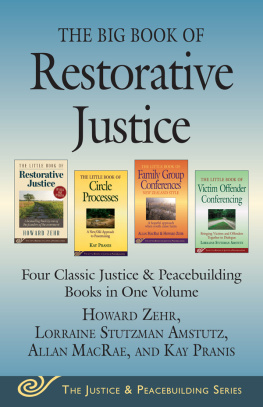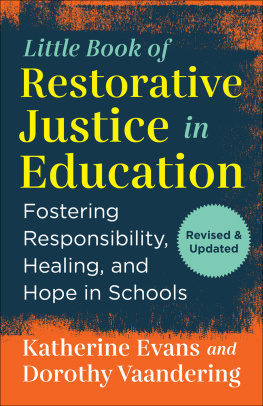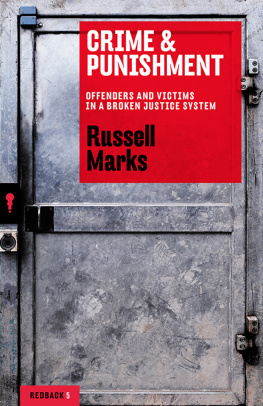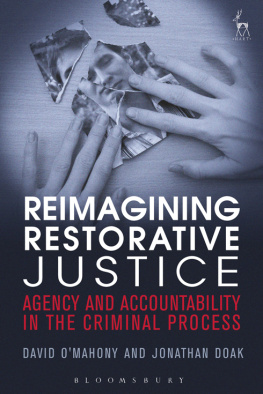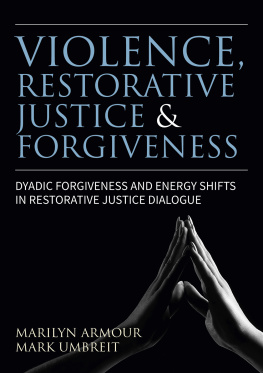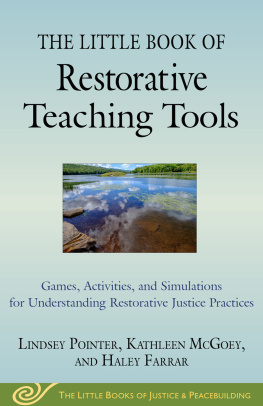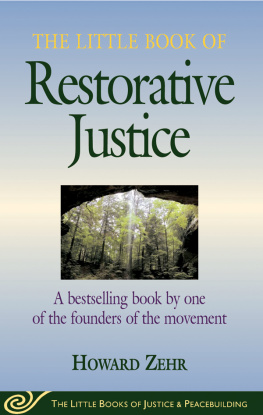
Restoring Harm
To what extent is restorative justice able to restore the harm suffered by victims of crimes of interpersonal violence? Restorative justice is an innovative, participatory and inclusive reaction to crime that permits victims and offenders to engage in a communication process about the consequences of the offence. It looks to the future, actively involving parties to find, agree and implement ways to repair the harm.
Restoring Harm analyses the restoration process from a psychosocial point of view and discusses the role of victimoffender mediation within such a process. It brings together literature from the fields of restorative justice, victimology and psychology, and shares original findings from victims who were interviewed in Belgium and Spain. This book not only offers descriptive findings but also provides a theoretical and comprehensive model that elucidates several possibilities for why victimoffender mediation may or may not play a role in victims processes of emotional restoration.
Well informed and well documented, this volume brings together evidence from different regions and develops a detailed discussion of the effectiveness of restorative justice with regard to victims. Providing new and solid evidence thanks to a quasi-experimental methodological design, theory and practice come together to offer relevant reflections for researchers and practitioners who are concerned about the victims position within victimoffender mediation and desire to develop a victim-sensitive restorative justice practice.
Daniela Bolvar is an Assistant Professor at the School of Social Work, at the Pontifical Catholic University of Chile. She holds degrees in Psychology and Community Psychology from the same university. In 2012, she obtained a PhD in Criminological Sciences at the Leuven Institute of Criminology, KU Leuven. She has participated in a number of European research projects related to restorative justice and written several articles and book contributions on the topic. She co-edited the book Victims and Restorative Justice (Routledge, 2017) and is a board member of the International Journal of Restorative Justice published by Eleven, the Netherlands.
Routledge Frontiers of Criminal Justice
PoliceCitizen Relations Across the World
Comparing Sources and Contexts of Trust and Legitimacy
Edited by Dietrich Oberwittler and Sebastian Roch
Privatising Punishment in Europe?
Edited by Tom Daems and Tom Vander Beken
Critical Perspectives on Coercive Interventions
Law, Medicine and Society
Edited by Claire Spivakovsky, Kate Seear and Adrian Carter
The Anthropology of Police
Edited by Kevin G. Karpiak and William Garriott
Criminal Justice and Regulation Revisited
Essays in Honour of Peter Grabosky
Edited by Lennon Y. C. Chang and Russell Brewer
The Pixelated Prisoner
Prison Video Links, Court Appearance and the Justice Matrix
Carolyn McKay
Prisoner Resettlement in Europe
Edited by Frieder Dnkel, Ineke Pruin, Anette Storgaard and Jonas Weber
Restoring Harm
A Psychosocial Approach to Victims and Restorative Justice
Daniela Bolvar
For more information about this series, please visit:
www.routledge.com/Routledge-Frontiers-of-Criminal-Justice/book-series/RFCJ
Restoring Harm
A Psychosocial Approach to Victims
and Restorative Justice
Daniela Bolvar
First published 2019
by Routledge
2 Park Square, Milton Park, Abingdon, Oxon OX14 4RN
and by Routledge
52 Vanderbilt Avenue, New York, NY 10017
Routledge is an imprint of the Taylor & Francis Group, an informa business
2019 Daniela Bolvar
The right of Daniela Bolvar to be identified as author of this work has been asserted by her in accordance with sections 77 and 78 of the Copyright, Designs and Patents Act 1988.
All rights reserved. No part of this book may be reprinted or reproduced or utilized in any form or by any electronic, mechanical, or other means, now known or hereafter invented, including photocopying and recording, or in any information storage or retrieval system, without permission in writing from the publishers.
Trademark notice: Product or corporate names may be trademarks or registered trademarks, and are used only for identification and explanation without intent to infringe.
British Library Cataloguing-in-Publication Data
A catalogue record for this book is available from the British Library
Library of Congress Cataloging-in-Publication Data
Names: Bolivar, Daniela, author.
Title: Restoring harm : a psycho-social approach to victims and restorative justice / Daniela Bolivar.
Description: Abingdon, Oxon ; New York, NY : Routledge, 2019.
Identifiers: LCCN 2018036549| ISBN 9781138819047 (hardback) | ISBN 9781315744865 (ebook)
Subjects: LCSH: Restorative justice. | Victims of crimes.
Classification: LCC HV8688 .B65 2019 | DDC 364.6/8dc23
LC record available at https://lccn.loc.gov/2018036549
ISBN: 978-1-138-81904-7 (hbk)
ISBN: 978-1-315-74486-5 (ebk)
Typeset in Bembo
by Wearset Ltd, Boldon, Tyne and Wear
To Toya and Pepe
For providing a foundation of curiosity and promoting my interest in doing something useful for society.
To Maite
For inspiring my days and enlightening my nights.
Contents
For decades now, victim advocates have denounced the neglected role of the victim in criminal law procedures. According to some, the same problem applies to restorative justice, as demonstrated by the limited or sometimes non-existent role of the victim in restorative processes. Restorative justice is often argued on behalf of or achieved in the name of the victim. However, the expanding restorative justice discourse in many countries does not always ensure restorative practices that fit with its internationally accepted standards. The inclusive character and patirticipatory principle of restorative justice are widely recognised foundations but not always respected when it comes to the most directly affected party. Victims seem to become an Achilles heel in many programmes that recruit their cases in the criminal justice field, where referral criteria are predominantly based on offender and offence-related characteristics. Furthermore, when victims do participate in victimoffender mediation, family group conferences or peace-making circles, we do not yet understand very well what motivates them or keeps them away, what they experience, what they expect or how they move along the process of dialogue with the other party. It seems paradoxical that a movement that claims to repair harm, to heal and to empower gives minor attention to the victim. Therefore, research into the meaning and consequences of restorative justice for the victim, and also into the personal and relational dynamics of restorative justice processes, is greatly needed.
The present study by Daniela Bolvar is an excellent example of how this type of qualitative research can be done. It goes far beyond assessing the degree of satisfaction for victims, as the title of this book rightly suggests. The study goes much deeper than the only one inch criticism that is sometimes levelled against restorative justice research. The author is one of the few international scholars who has reviewed and analysed existing studies on victims positions and experiences when they participate in restorative justice processes. She focused specifically on the notions of harm and restoration, which as generally accepted concepts might seem self-explanatory in restorative justice practice and research, but remain largely underdeveloped and under-researched. Daniela Bolvar has remedied this shortage explicitly and convincingly. She approached this conceptual venture from a socialpsychological perspective, also making use of knowledge from victimology and trauma research.


